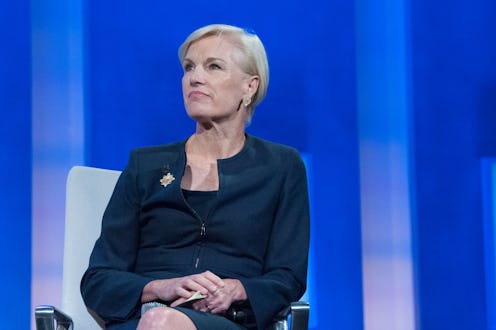News
How Planned Parenthood Reduces Abortion Rates

A new study detailing the fall of the national abortion rate just threw a major wrench in the fight to defund Planned Parenthood. According to the Guttmacher Institute, America's abortion rate just hit a record low — even lower than when the Supreme Court case Roe v. Wade first legalized the procedure in 1973. The new milestone is likely caused by a few contributing factors, but one of the main contenders is access to facilities like Planned Parenthood, which provides services before women need abortions so that they don't end up having to seek the procedure in the first place. Does Planned Parenthood reduce the abortion rate? There's strong evidence to suggest the organization's existence helps limit the procedure's frequency, which is a great reason to keep it around.
The new study shows that the abortion rate in 2014 was 14.6 per 1,000 women between the ages of 15 and 44 — lower than the 1973 rate of 16.3 abortions per 1,000 in 1973. Rachel Jones, the study's primary investigator, told WBUR that the big driver of the falling abortion rate is better access to contraception, as evidenced by the coinciding record lows for the American birth rate. "Abortion is going down, and births aren't going up," Jones said, suggesting that women are preventing pregnancies, not just not having abortions.
That's where Planned Parenthood, one of the biggest providers of contraception in the country, comes into the equation. PP internally estimates that it helps avoid almost 200,000 abortions ever year due to its contraceptive services, which would spike the abortion rate significantly. Also, because only 3 percent of PP's services are dedicated to abortion, shuttering the organization, as some are proposing to do, would likely not cause a significant fall in the abortion rate, but rather a rise, due to all the women left without contraceptive care. Without Planned Parenthood, the pro-life cause would actually be harmed, even if it would seem like a victory for the movement on the surface.
There is another potential cause of the declining abortion rate, one that pro-life activists take credit for: The rising tide of anti-abortion sentiment across the country, particularly in state legislatures. Since 2010, states have enacted more than 350 abortion regulations, accounting for nearly one-third of all restrictions enacted since Roe v. Wade legalized the procedure. Kristi Hamrick, a spokesperson for Americans United for Life, told WBUR that the drop in abortions is due to increased restrictions against the procedure at the state level. "These [restrictions] have been game-changers, and we see the abortion rate dropping in response," Hamrick told the radio station.
However, the data doesn't necessarily support Hamrick's conclusion. According to Guttmacher, the restrictions have had some impact on the falling abortion rate, but the rate of abortions also fell in states that did not enact restrictions. Additionally, while state-level restrictions have skyrocketed in the last five years, they do not explain the decades-long decline in the abortion rate.
The strong evidence that Planned Parenthood lowers the abortion rate won't be enough for hardcore anti-abortion activists, because they really want to see abortion prohibited under any circumstances. Realistically, though, that's never going to happen – even in places that have practically eliminated the availability of abortions, women still dangerously try to terminate their own pregnancies.
Planned Parenthood provides safe medical supervision for a procedure that women will try to do anyway, so respecting their lives means giving them access to a place to do it in a way that doesn't put them at risk. Plus, places like Planned Parenthood, which provide low-cost or free contraception, not only prevent abortions, but also save women from the emotional pain of undergoing the procedure, which pro-life activists often neglect to recognize.
Planned Parenthood is a necessity for American public health, and the good that it does in the real lives of American women far outweighs the ideological objections of pro-life activists. Protecting PP is important on a dozen levels, and keeping the abortion rate low isn't even one of the most important. However, it may be a strong argument to prevent its defunding by the conservative government, if they can see the clear benefits it brings to American society.